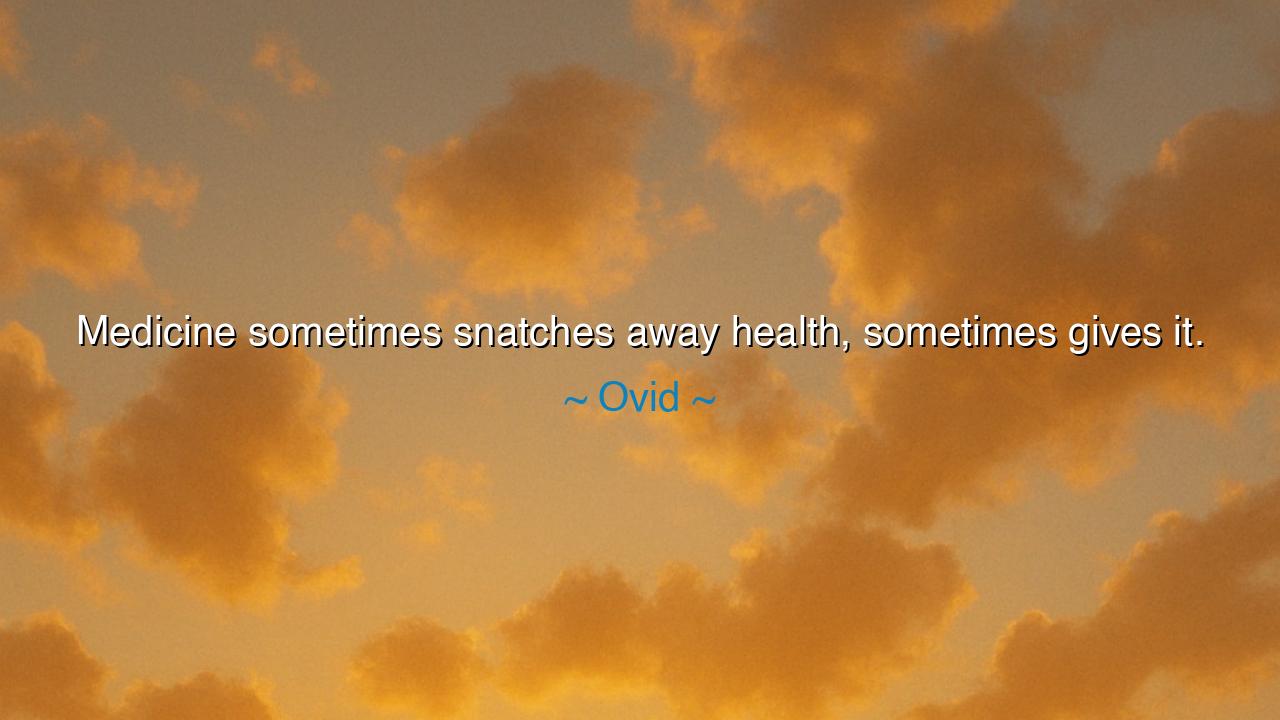
Medicine sometimes snatches away health, sometimes gives it.






“Medicine sometimes snatches away health, sometimes gives it.” Thus spoke Ovid, the Roman poet whose words have survived the centuries like carved stone in the temple of wisdom. Though he lived in an age when the art of healing was still bound to superstition and mystery, his insight pierces even the heart of modern truth. For in this brief saying, he reveals the paradox of all human striving — that our attempts to heal may also harm, that the very tools of salvation may become the instruments of suffering when wisdom is forgotten.
In Ovid’s time, physicians were as much philosophers as healers, and the body was thought to mirror the balance of the cosmos — the four humors of life mirroring earth, air, fire, and water. To restore health was to restore harmony. Yet even then, the ancients saw that medicine, wielded without understanding or moderation, could turn from a blessing to a curse. A potion meant to cure fever could poison; a surgery to save could destroy. Thus, Ovid’s words stand as both observation and warning: that the hand which heals must also possess humility, for the line between remedy and ruin is thin as the edge of a blade.
This truth echoes through history. In the Middle Ages, physicians bled their patients to “balance the humors,” not knowing they drained the life they sought to save. In later centuries, mercury was prescribed as a cure — even as it slowly poisoned those it touched. And yet, it was not malice but ignorance that brought such pain. The healer sought to help but lacked the full wisdom of the body’s mystery. Thus, Ovid’s ancient voice reminds us that good intention alone is not enough; true healing requires knowledge, care, and respect for the delicate fabric of life.
Consider, too, the tale of Ignaz Semmelweis, the Hungarian doctor of the nineteenth century who discovered that washing hands between patients could save countless lives. Before him, physicians moved from one mother to another, carrying invisible death upon their fingers. When Semmelweis urged them to cleanse, they mocked him. His discovery — the simplest of medicines — was dismissed, and countless women perished. Only after his death did the world acknowledge his truth. From this story we learn that medicine gives health only when guided by humility, when healers are willing to admit that even their wisdom has limits, and that nature’s laws must be honored, not defied.
Yet Ovid’s meaning reaches further still, into the spirit as much as the flesh. For medicine is not only what comes from the hand of physicians — it is every remedy we seek for the wounds of life. Sometimes the cure for our sorrow, our restlessness, our fear, becomes itself a new affliction. We take refuge in distraction, in excess, in comfort that numbs instead of heals. The ancients would say that one must learn to distinguish between the medicine that restores the soul and the medicine that only dulls its pain. For what heals the body may harm the heart, and what strengthens the spirit may demand great suffering first.
Therefore, let us approach all healing — of body, mind, and soul — with reverence. Medicine gives health when used with balance, with wisdom, and with compassion; it snatches it away when pride, haste, or greed take its place. The true healer, whether doctor, teacher, or friend, must never forget that life itself is sacred, and that to interfere with its rhythms is to walk the edge of divine mystery. The wise do not rush to cure what they do not understand; they listen, they observe, and they honor the body’s own power to mend.
The lesson is timeless: knowledge without humility is dangerous, but humility without action is useless. Seek understanding, but temper it with gentleness. Trust science, but remember that wisdom lies not only in the mind, but in the heart. And for those who suffer, know this — even when medicine fails, the spirit may yet heal through patience, through love, and through courage.
Thus, let Ovid’s ancient words echo in our age of great power and peril: “Medicine sometimes snatches away health, sometimes gives it.” Use the gifts of healing with care. Let every act of treatment be guided not only by skill, but by compassion. For in the hands of the wise, medicine is the servant of life — but in the hands of the proud, it becomes its master. Choose always to heal, never to harm, and you will walk in the path of the true physician — the one who heals both body and soul.






AAdministratorAdministrator
Welcome, honored guests. Please leave a comment, we will respond soon